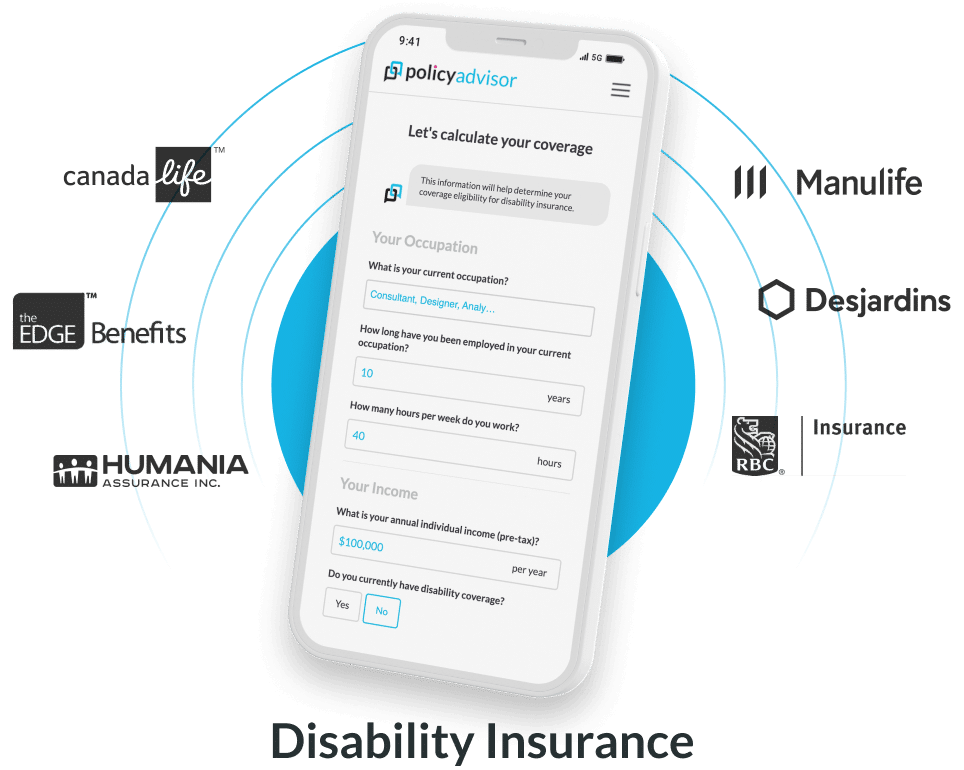- Disability insurance offers vital financial support in the event of illness or injury, ensuring continued income during periods of incapacity
- Disability can encompass various conditions, categorized into total and partial disabilities, each triggering benefits under specific circumstances
- Group plans typically have stricter eligibility criteria and limited customization, whereas individual plans offer tailored coverage, often with an "own occupation" definition, ideal for doctors
- Factors such as customization, portability, definition of disability, underwriting process, premiums, benefit period, tax implications, and future purchase options influence the choice between group and individual disability insurance
When it comes to protecting your income as a doctor, disability insurance is a must-have. But with having to choose between group disability and individual disability insurance for doctors, how do you know which one is better?
In this article, we help you understand the intricacies of each and explore which option aligns best with your needs.
What is disability insurance?
Disability insurance provides financial support if you cannot work due to illness or injury. It ensures you receive a portion of your income, helping to cover living expenses during periods when you can’t earn a salary.
If you are an incorporated doctor, disability insurance is particularly important. It helps you manage business overhead expenses along with other financial obligations.
One of the first steps to getting disability insurance is understanding what disability means. Disability is a broad term covering various conditions, from illnesses like cancer to temporary setbacks such as bone fractures. Alcoholism and drug addiction are also recognized as disabilities in Canada.
The different definitions of disability significantly impact how and when benefits are paid out.
Let’s take a quick look at these definitions:
📄 Own occupation: “Own occupation” means you receive benefits if you cannot perform the duties of your specific job. For doctors, this is particularly important as it ensures coverage if you cannot practice in your specialized field, even if you can work in another capacity.
📄 Any occupation: “Any occupation” requires that you be unable to perform any job for which you are reasonably qualified based on your education, training, and experience. This definition is more stringent and can be challenging for professionals like doctors who may still be able to work in a less demanding role.
📄 Regular occupation: “Regular occupation” is similar to “own occupation” but typically applies to your usual line of work without specifying your exact duties. This can offer broader coverage than “any occupation” but is not as tailored as “own occupation.”
What are the different types of disability insurance?
There are two different types of disability insurance, short-term and long-term disability:
Short-Term Disability (STD): STD provides benefits for a limited period, typically three to six months, to cover temporary disabilities caused by illness or injury. This coverage kicks in after a brief elimination period, ensuring income protection during short-term recovery.
Long-term disability (LTD): LTD offers benefits for an extended period, often until retirement age, if you are unable to return to work due to a serious illness or injury. LTD usually starts after STD benefits are exhausted, providing ongoing financial support for long-term or permanent disabilities.
Read more about short-term disability and long-term disability.
How do disability definitions affect your coverage?
The key difference between group and individual disability insurance lies in how they define disability. Group disability insurance typically uses the “any occupation” standard, which means you only receive benefits if you cannot perform any job. This can be problematic for doctors because, even if they can’t practice medicine, they might still be able to work in a different capacity or a less demanding role.
Individual disability insurance often uses the “own occupation” definition. This means that doctors receive benefits if they are unable to work in their specific medical field. This is crucial for physicians, as it takes into account the specialized skills and knowledge they have developed. Having an individual disability insurance policy with the “own occupation” clause ensures that if doctors can no longer practice in their specialty due to health issues, they will still have financial support.
Partial and residual disability benefits
It’s essential to consider how disability insurance handles partial and residual disabilities. Partial disability means you can still work but not at full capacity, while residual disability means there are certain job tasks you can no longer perform.
Group disability insurance plans often lack coverage for partial disabilities while individual disability insurance plans typically include coverage for both partial and residual disabilities. This is beneficial for doctors, as it allows them to receive benefits even if they can only work part-time or perform some of their job functions. This type of coverage provides financial security and peace of mind when facing a disabling condition.
What are the advantages and disadvantages of individual and group disability insurance?
Here are the advantages and disadvantages of individual and disability insurance:
| Factors | Group Disability Insurance | Individual Disability Insurance |
| Customization | Limited customization options | Extensive customization options for individual needs |
| Portability | Coverage tied to employment; may lose coverage if you change jobs | Portable coverage; not tied to employment |
| Definition of disability | Stricter definitions; may require total inability to work any occupation | Own occupation definition; coverage for inability to perform specific medical duties |
| Underwriting process | Typically requires minimal underwriting; may not require medical exams | Rigorous underwriting process may include medical exams and detailed health history disclosures |
| Premiums | Lower premiums due to risk pooling | Higher premiums reflecting personalized coverage |
| Benefit period | Often limited to short-term benefits for total disability | Flexible benefit periods, ranging from a few years to retirement age or beyond |
| Tax implications | Benefits may be taxable if the employer pays premiums | Benefits are generally tax-free if premiums are paid with after-tax dollars |
| Future purchase option | Typically not available; may need to purchase additional coverage separately | Future purchase options available to increase coverage without additional underwriting |
How does medical underwriting differ in group and individual disability plans?
Group policies typically involve minimal underwriting, with some not requiring medical exams. Conversely, individual policies may require detailed health history disclosures and medical examinations to assess your risk profile accurately.
For doctors especially, it’s crucial to know that certain health issues or dangerous hobbies might influence both the underworking steps and what you’ll end up paying for your disability insurance policy. It makes sense to tell insurers everything upfront when applying so that they can give an accurate assessment and make sure you’re covered properly.
What should you consider when choosing between group and individual disability insurance?
When deciding between group and individual disability insurance, it’s crucial to evaluate specific aspects of each option to ensure you select the best coverage for your needs.
Group coverage
When evaluating group or association disability insurance, ask the following questions:
- Can you convert to an individual plan without medical evidence of insurability if you change employers or leave the association?
- Can the plan be cancelled?
- Do benefits reduce with age?
- Will you still be covered during a strike or leave of absence?
- How long will the plan remain active?
- Is it an insured plan or an Administrative Services Only (ASO) arrangement?
- Is renewal in the plan guaranteed, and will evidence of good health be required?
- Is the price schedule guaranteed? If not, how much could the cost increase?
Individual coverage
For individual disability insurance, consider these factors:
- Are benefits paid if you can work but not at full capacity?
- If you are self-employed, can the plan cover deferred income taxes and other business expenses?
- Are there options to help you meet financial objectives, such as saving for retirement?
- Is there a refund of premiums offered after a specified period without a claim?
What to consider if you’d like to make the most of an individual and group disability plan?
Here are the questions you must ask yourself for any plan you consider:
- What percentage of income will be paid, and is there a dollar limit? How does it coordinate with other plans (e.g., benefits for you, your spouse, or dependent children)?
- When do benefits start? Are waiting periods different for accidents and illnesses? Is there a new waiting period for a recurrent disability?
- Are there limitations or exclusions, like a pre-existing condition clause?
- Can coverage be increased without evidence of good health?
- How long do benefits last, and are they taxable? Are they indexed for inflation?
- How is ‘disability’ defined in the plan?
- Is there a premium waiver while disabled? When does it begin? Are premiums refunded if injured or sick?
Learn more about the ideal policy term for disability insurance.
Which is better—group or individual disability insurance?
Deciding between group and individual disability insurance involves weighing the pros and cons of each option. Group disability insurance offers lower premiums, convenient enrollment, and coverage for pre-existing conditions without medical underwriting. However, it has limitations like less customization, coverage tied to employment, stricter definitions of disability, and shorter benefit periods.
On the other hand, individual disability insurance provides personalized coverage tailored to your specific needs, it is flexible and remains with you regardless of job changes. While individual policies typically have higher premiums and require medical underwriting, the benefits are generally tax-free if premiums are paid with after-tax dollars.
The key difference is that an individual policy is owned by the doctor and is customized to their needs. Many professionals combine both group and individual insurance, using group plans for short-term disability (STD) and individual plans for long-term disability (LTD) once the STD benefits are exhausted (This is because STD is only available in a group plan). This approach ensures continuous and comprehensive coverage, securing financial stability throughout a doctor’s career.
How to apply for group or individual disability insurance?
Group coverage through work typically involves automatic enrollment by your employer or union, especially in large companies where medical questionnaires may not be required.
In smaller organizations, you might need to provide medical information or undergo a physical exam for group coverage. The insurance company assesses each applicant individually due to the smaller risk pool.
On the other hand, applying for an individual plan involves a more detailed process where your application is evaluated by the insurance company. Your insurer collects information about your health, job, earnings, and hobbies, and you may need to undergo a physical exam or provide additional medical or financial details.
While most applicants for individual disability insurance are approved, some may face exclusions, higher rates, or other limitations depending on their individual circumstances.
Read more about getting individual disability insurance even if you’re covered through work
Want help choosing between group and individual disability insurance?
Our licensed experts are here to help! At PolicyAdvisor, our advisors assess your needs, compare policies, and help you select and apply for the insurance that meets your unique needs.
Frequently Asked Questions
When should doctors consider purchasing disability insurance?
The ideal time to buy disability insurance is early in your career. While it’s possible to purchase at any point, securing coverage early ensures you’re protected from the start, often at a lower cost. Plus, as your income grows, you can adjust your coverage accordingly. Given the potential consequences of losing your ability to earn a living, investing in long-term disability insurance is vital for doctors.
Does disability insurance for physicians cover mental health issues?
Absolutely, you have the flexibility to transition from a group disability insurance plan to an individual one as your career progresses. An individual plan offers greater flexibility and may provide more comprehensive coverage tailored to your evolving needs. Consulting with a financial planner is advisable to determine the optimal solution for your specific situation and requirements when evaluating disability insurance plans.
Are there any exclusions in disability insurance coverage?
Disability insurance policies may contain exclusions, specifying conditions or circumstances where benefits are not payable. Common exclusions include pre-existing conditions, self-inflicted injuries, and disabilities resulting from illegal activities.
Understanding disability insurance is crucial for doctors to protect their income in case of unexpected events. This article helps doctors choose between group and individual disability insurance by explaining the important differences and things to consider.






